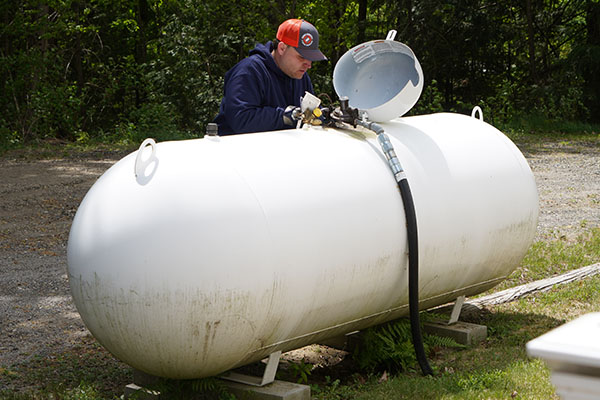Table of Contents
Propane is essential in many homes for heating and cooking. A home propane tank requires regular refills, much like a car. Generally, propane suppliers offer two delivery options: automatic, where the supplier monitors and refills your tank when necessary, and will-call, where you track your own propane consumption and request a delivery. This article explores both fuel delivery types, automatic vs will call propane delivery. This way, you can choose the best fit for your lifestyle and needs.
Automatic vs Will Call Propane Delivery: Factors to Consider
Continue on to understand the distinct aspects of these propane delivery methods.
Understanding Automatic Propane Delivery

Automatic delivery offers a hassle-free solution where the provider tracks your propane use and local weather trends to predict your needs, scheduling deliveries accordingly. Once enrolled, your home becomes part of their delivery route, ensuring constant replenishment and eliminating depletion risks. It’s ideal for those using propane for heating and hot water, with busy schedules, or owning rental properties.
Providers customize automatic delivery with options like advance calls or extra deliveries at no cost if needed. By enrolling, your residence is integrated into their delivery schedule, consistently keeping your tank full. This method suits those who depend on propane for critical needs, have busy lives, or manage rental or vacation homes.
Advantages & Disadvantages of Automatic Propane Delivery
Automatic propane delivery offers convenience and assurance, removing the need for tank checks and supply worries, and providing priority service during high demand. It’s ideal for those seeking comprehensive heating solutions, especially beneficial for older HVAC systems requiring more maintenance.
However, the downside is trusting a supplier’s set schedule, which may not always align with individual needs. Customers must inform suppliers of significant household changes to avoid shortages. Additionally, as some contracts include HVAC service fees, this option may not be cost-effective for those seeking only propane delivery.
Financial Aspects of Automatic Propane Delivery
Choosing automatic propane delivery might involve an initial higher cost, with some providers billing annually. However, this approach can lead to significant savings over time. The assurance of never running out of propane means avoiding charges that come with empty tanks. Some companies offer price protection plans, securing your rate for a specified duration. This feature shields you from price hikes in fuel costs.
How Will-Call Propane Delivery Works

Will-call delivery places the entire responsibility on the customer, encompassing every aspect from monitoring fuel levels to scheduling deliveries. In this arrangement, you are responsible for regularly reading the tank’s percentage gauge and understanding its indications. This method demands a proactive approach, ensuring you stay vigilant about propane levels and call for a refill when necessary.
Advantages & Disadvantages of Will-Call Propane Delivery
Will-call propane delivery offers control over ordering and payment, but it requires you to monitor propane levels, risking shortages and incurring fees if neglected. Scheduling deliveries can be difficult, especially during peak periods, as orders are fulfilled on a first-come, first-served basis, possibly leading to delays. Without a full-service propane provider, you might need separate HVAC services for heating system maintenance, complicating home care.
Financial Aspects of Will-Call Propane Delivery
Will-call deliveries come with various potential fees, especially if your tank empties before the scheduled delivery. Emergency deliveries, including those on nights, weekends, or during weekdays, often incur additional charges. Moreover, if your tank runs dry, there’s a necessity for various maintenance procedures like system checks, safety or pressure testing, line bleeding, or relighting appliance pilots. Collectively, these services can result in a significant accumulation of fees.
Deciding Between Propane Delivery Options

To determine the best propane delivery option for you, assess your willingness to monitor your tank levels and handle emergencies. Consider the significance of propane in your home and the potential impact of running out. Reflect on whether vulnerable individuals like children or seniors are present in your home who would be particularly affected by a propane shortage. Also, evaluate your availability to regularly check the tank and realistically gauge your likelihood of remembering to do so.
Key Considerations
For individuals dependent on propane, choosing automatic deliveries ensures a constant supply without the stress of unexpected shortages or exorbitant fees. This option simplifies daily life, especially for those with busy schedules filled with meetings and unexpected events. On the other hand, will-call deliveries are ideal for those looking to avoid additional fees, as they allow payment solely for the propane needed. This method suits you well if you are vigilant about monitoring your tank levels and can manage the consequences of a potential run-out, eliminating the necessity for an additional subscription service.
Propane Delivery Frequently Asked Questions

Here are three of the most common queries regarding propane delivery:
How frequent are automatic deliveries?
The regularity of automatic deliveries varies with each household’s propane consumption rate, making it a personalized schedule based on individual usage patterns.
How do I read my propane tank’s percentage gauge?
For will-call delivery, it’s recommended to schedule your next delivery when your tank’s propane level falls to around 30%. This ensures a timely refill before the supply runs critically low.
How do I read my propane tank’s percentage gauge?
To determine your tank’s propane level, open the tank lid and locate the round dial that resembles a speedometer. This dial displays the propane percentage in your tank. For instance, a reading of 30 on this dial indicates the tank is 30% full.
Conclusion
Securing a steady propane supply for your home involves establishing a regular account for automatic deliveries or opting for will-call service, where you request refills as needed. Each approach has its advantages and challenges. When deciding between automatic vs will call propane delivery, select the option that aligns best with your needs and preferences. If your initial choice doesn’t meet your expectations, you always have the option to switch to the alternate method in the future.
Call Lake Region Energy For Superior Propane Delivery Services

When you need exceptional propane delivery service in Cumberland County, ME, and the surrounding area, be sure to contact Lake Region Energy. We offer quick, affordable, and high-quality fuel deliveries.
Count on us to always provide you with friendly and unbeatable services. Call us today to learn about our different delivery plans and financing options.
Lake Region Energy also offers a complete line of heating and cooling services to improve your home’s energy efficiency, comfort, indoor air quality, and more. Our services include boiler tune-ups, air conditioner repairs, mini-split installations, and much more. Call now!
For more information about our propane deliveries and HVAC services, be sure to contact Lake Region Energy. You can click here to contact us, or you can call us at (207) 839-5500 to find out more. Click the link to view our service area.
Related Articles:
